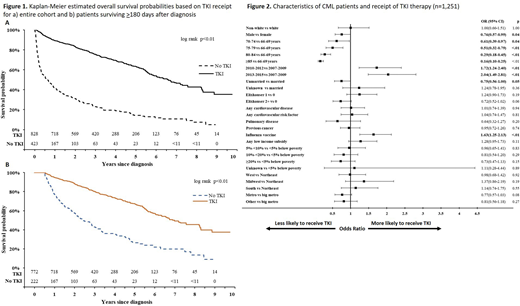Introduction: About half of all patients (pts) diagnosed with chronic myeloid leukemia (CML) are >65 years (yrs) old. Pts treated with a BCR-ABL1-directed tyrosine kinase inhibitor (TKI) are found to have life expectancy near that of the general population. Despite this, some CML pts never receive a TKI. Some providers may consider older age, decline in fitness, increased comorbidity burden and higher risk of treatment complications as precluding factors, but there are very limited real-world data on the characteristics of CML pts not receiving TKI therapy.
Methods: Using the Surveillance, Epidemiology, and End Results-Medicare linked database, we assembled a population-based cohort of older adults diagnosed with CML during 2007-2015 who: 1) were age 66-99 yrs at diagnosis, 2) had continuous Medicare Parts A/B and D coverage from 1 year and 3 months, respectively, before diagnosis to end of follow-up (change in Medicare status, death, or 12/31/2016, whichever came first) and 3) did not receive a TKI within 3 months before diagnosis. Pts were categorized as TKI users (imatinib, bosutinib, dasatinib, nilotinib, ponatinib) or non-users from CML diagnosis to end of follow-up. Comorbidities were identified using ICD-9/10 codes. Pearson's Chi-Square tests were used to compare patient characteristics in a bivariate manner, and multivariable logistic regression was used to assess factors associated with TKI use. All statistical tests were two-sided and conducted with SAS (Version 9.4).
Results: The cohort included 1251 pts with a median age of 77 (interquartile range [IQR]: 71-83) yrs; 51% were female and 87% were white. During the median follow-up of 2.17 (IQR: 0.74-4.13) yrs, 828 pts (66.2%) received a TKI. Median overall survival was 6.6 yrs and 0.6 yrs among TKI users and non-users, respectively (log rank test p<.01, Figure 1a). Among 545 pts with known cause of death, the main causes of death were similar in both groups: CML (26.3% in TKI users, 24.3% in non-users, p=0.59) and heart disease (19.1% in TKI users, 15.9% in non-users, p=0.33).
Fewer TKI users had underlying cardiovascular diseases (26.1% vs. 33.6%; p<0.01), heart failure (13.5% vs. 19.6%; p<.01) and pulmonary diseases (2.5% vs. 5.2%; p=0.01) than those without TKI. Pts with baseline hyperlipidemia were more likely to receive a TKI (59.7% vs. 45.9%; p<0.01). However, in multivariable analysis (Figure 2), cardiovascular diseases, cardiovascular disease risk factors, and pulmonary diseases were not significantly associated with receipt of TKI therapy.
Compared with pts aged 66-69 yrs, those aged 70-74 (odds ratio [OR]=0.61, 95% confidence interval [CI]: 0.39-0.97; p=0.04), 75-79 (OR=0.51, 95% CI: 0.32-0.79; p<.01), 80-84 yrs (OR=0.29, 95% CI: 0.18-0.45; p<.01) and ≥85 yrs (OR=0.16, 95% CI: 0.10-0.25; p<.01) were less likely to receive a TKI (Figure 2). Being a male or unmarried was also associated with decreased likelihood of TKI treatment (OR=0.76, 95% CI: 0.57-0.99; p=0.04 and OR=0.75, 95% CI: 0.56-1.00; p=0.05, respectively), while increased number of comorbidities had a similar but borderline association (modified Elixhauser comorbidity index 2+ vs. 0, OR=0.72, 95% CI: 0.52-1.02; p=0.06). The likelihood of TKI use increased with year of diagnosis (2007-2009: reference; 2010-2012: OR=1.72, 95% CI: 1.24-2.40; p<.01 and 2013-2015: OR=2.04, 95% CI: 1.49-2.81; p<.01). Receipients of an influenza vaccine within 12 months prior to diagnosis (an indicator of healthcare access) were more likely to receive a TKI (OR=1.63, 95% CI: 1.25-2.13; p<.01). Race, previous cancer, income and geogrpahic region did not appear to be associated with TKI use.
We also conducted an analysis including only pts surviving >180 days after CML diagnosis. While the percentage of TKI non-used decreased from 33.8% in the overall cohort to 23.5% in the subset, TKI use was still associated with better survival (Figure 1b) and the predictors for TKI use were very similar.
Conclusions: We report one of the largest analyses of older CML pts demonstrating that one-third did not receive a TKI. Despite multiple TKIs available with differing toxicity profiles and the option to dose-reduce, increased age and male gender were associated with non-receipt of a TKI. Pts diagnosed in more recent years or with better access to healthcare were more likely to receive TKIs. These data highlight a potential area for improvement as a trial of TKI therapy should be strongly considered for most CML pts.
Wang:Celgene/BMS: Research Funding. Zeidan:Otsuka: Consultancy, Honoraria; Abbvie: Consultancy, Honoraria, Research Funding; Jazz: Consultancy, Honoraria; Celgene / BMS: Consultancy, Honoraria, Research Funding; Pfizer: Consultancy, Honoraria, Research Funding; Ionis: Consultancy, Honoraria; Aprea: Research Funding; Astellas: Consultancy, Honoraria; Acceleron: Consultancy, Honoraria; Taiho: Consultancy, Honoraria; Boehringer-Ingelheim: Consultancy, Honoraria, Research Funding; Daiichi Sankyo: Consultancy, Honoraria; Takeda: Consultancy, Honoraria, Research Funding; Cardiff Oncology: Consultancy, Honoraria, Other; BeyondSpring: Consultancy, Honoraria; Cardinal Health: Consultancy, Honoraria; Incyte: Consultancy, Honoraria, Research Funding; Trovagene: Consultancy, Honoraria, Research Funding; MedImmune/Astrazeneca: Research Funding; Astex: Research Funding; CCITLA: Other; Leukemia and Lymphoma Society: Other; Epizyme: Consultancy, Honoraria; Novartis: Consultancy, Honoraria, Research Funding; Agios: Consultancy, Honoraria; Seattle Genetics: Consultancy, Honoraria; ADC Therapeutics: Research Funding. Huntington:Genentech: Consultancy; Celgene: Consultancy, Research Funding; DTRM: Research Funding; TG Therapeutics: Research Funding; Pharmacyclics: Honoraria; Astrazeneca: Honoraria; Novartis: Consultancy; Bayer: Consultancy, Honoraria; AbbVie: Consultancy. Ma:Bristol-Myers Squibb: Consultancy, Research Funding; Celgene: Research Funding. Podoltsev:Genentech: Research Funding; Astex Pharmaceuticals: Research Funding; CTI biopharma: Consultancy, Honoraria, Research Funding; Agios Pharmaceuticals: Consultancy, Honoraria; Blueprint Medicines: Consultancy, Honoraria; Daiichi Sankyo: Research Funding; Sunesis Pharmaceuticals: Research Funding; Jazz Pharmaceuticals: Research Funding; Alexion: Consultancy, Honoraria; AI Therapeutics: Research Funding; Samus Therapeutics: Research Funding; Bristol-Myers Squib: Consultancy, Honoraria; Celgene: Consultancy, Honoraria, Research Funding; Pfizer: Consultancy, Honoraria, Research Funding; Boehringer Ingelheim: Research Funding; Astellas Pharma: Research Funding; Kartos Therapeutics: Research Funding; Novartis: Consultancy, Honoraria; Incyte: Consultancy, Honoraria; Arog Pharmaceuticals: Research Funding.
Author notes
Asterisk with author names denotes non-ASH members.


This feature is available to Subscribers Only
Sign In or Create an Account Close Modal